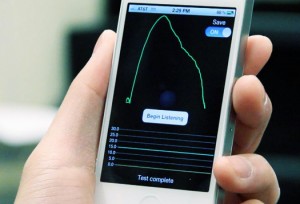 UW CSE’s SpiroSmart is featured by Futurity.
UW CSE’s SpiroSmart is featured by Futurity.
SpiroSmart is a mobile phone platform that acoustically analyzes lip reverberation, making it possible to monitor pulmonary ailments such as asthma, chronic obstructive pulmonary disease, and cystic fibrosis. Accuracy is within 5% of expensive purpose-built commercial devices, meeting the medical community’s standards for accuracy.
Read the Futurity post here. Learn more about SpiroSmart here. Read more →
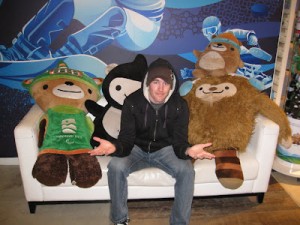 Google’s corporate-wide “Interns Making an Impact” feature today highlights UW CSE Ph.D. student Tim Blakely, working at Google Seattle. Tim is the lead developer on BigBrain, a large-scale computational neuroscience tool built on the cloud. The project began as an exploratory venture between Google and the Allen Institute for Brain Science (AIBS) to investigate whether the cloud could provide a platform for doing massively parallel, large-scale neural simulations.
Google’s corporate-wide “Interns Making an Impact” feature today highlights UW CSE Ph.D. student Tim Blakely, working at Google Seattle. Tim is the lead developer on BigBrain, a large-scale computational neuroscience tool built on the cloud. The project began as an exploratory venture between Google and the Allen Institute for Brain Science (AIBS) to investigate whether the cloud could provide a platform for doing massively parallel, large-scale neural simulations.
Read more here. Read more →
 The stodgy traditionalists at Slate lament the research of UW CSE Ph.D. student Jinna Lei:
The stodgy traditionalists at Slate lament the research of UW CSE Ph.D. student Jinna Lei:
“As a result, chefs are imagined not as autonomous virtuosi or gifted craftsmen but as enslaved robots who should never defy the commands of their operating systems.”
The good news for Jinna: the article describes other, related research as “even more degrading.”
Read the article here. Then … “Robot, bake me some brownies!” Read more →
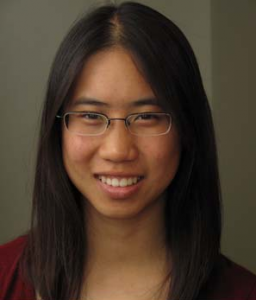 An article in New Scientist describes the work of UW CSE Ph.D. student Jinna Lei:
An article in New Scientist describes the work of UW CSE Ph.D. student Jinna Lei:
“Celebrity chef apps, online how-to videos and recipe-sharing websites have all joined traditional cookbooks as guides for the amateur epicurean. But wouldn’t it be nice if your kitchen could help you prepare a meal? …
“Jinna Lei at the University of Washington has also installed cameras in the kitchen to watch over novice chefs. Lei and colleagues used Kinect-like depth-sensing cameras capable of recording both the shape and appearance of kitchen objects, allowing them to track cooking actions, such as whether a particular ingredient has been added to a bowl.
“The system uses both object and action-recognition to keep track of what the cook is doing …
“Eventually, Lei hopes the system will be able to prompt chefs when they make a mistake.”
Read the article here. Read more →
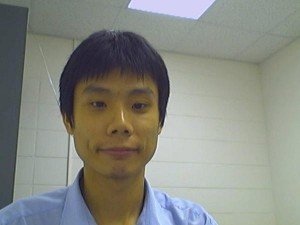 Yanping Huang, a UW CSE Ph.D. student, is one of 50 recipients of International Predoctoral Fellowships from the Howard Hughes Medical Institute.
Yanping Huang, a UW CSE Ph.D. student, is one of 50 recipients of International Predoctoral Fellowships from the Howard Hughes Medical Institute.
HHMI launched the International Student Research Fellowships Program last year to support international students during their third to fifth years of graduate school in the United States. “We are pleased to be able to support some of the world’s most outstanding graduate students in the biomedical sciences” says William R. Galey, program director for HHMI’s graduate and medical education programs.
Congratulations Yanping! Information the program here. List of recipients here. Read more →
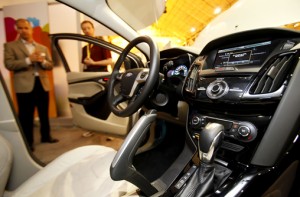 UW CSE Ph.D. student Franzi Roesner and UW CSE Ph.D. alum Stefan Savage (now on the faculty at UCSD) are extensively quoted in this ComputerWorld article:
UW CSE Ph.D. student Franzi Roesner and UW CSE Ph.D. alum Stefan Savage (now on the faculty at UCSD) are extensively quoted in this ComputerWorld article:
“It’s not time for full-on panic, but researchers have already successfully applied brakes remotely, listened into conversations and more.”
Read more here. Read more →
 The IEEE Presidents’ Change the World Competition recognizes students who develop unique solutions to real-world problems using engineering, science, computing, and leadership skills to benefit their community, the world at large, or both.
The IEEE Presidents’ Change the World Competition recognizes students who develop unique solutions to real-world problems using engineering, science, computing, and leadership skills to benefit their community, the world at large, or both.
UW CSE’s FoneAstra has been recognized with third place in the 2012 competition.
FoneAstra is an ARM7-based board that plugs into the data port of low-tier mobile phones. With attached sensors, custom applications can be run through FoneAstra. As a prototype, the per-unit cost of the board is $15. FoneAstra, enhanced with temperature probes, is being used for vaccine cold chain monitoring – in developing countries, this cost effective method can make vaccine implementation efficient and cut possible losses from temperatures of vaccines that are not extensively monitored. In addition, FoneAstra is being used for accurately monitoring milk temperatures by providing three levels of safety.
The FoneAstra team includes Rohit Chaudhri, William Thomas Pitts, Darivanh Vlachos, Troy Martin, Jillyn Johnson, Eleanor O’Rourke, Jaylen Scott Vanorden, Michael Falcone, Waylon Brunette, Mayank Goel, and Rita Sodt.
Congratulations! Read about the competition here. Learn more about FoneAstra here. Learn about UW’s ICTD activities – Change – here. Read more →
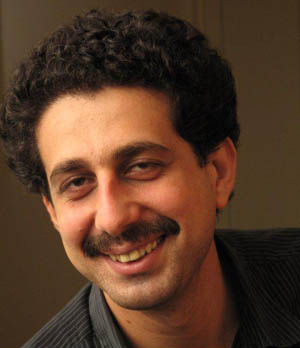 When University of Texas faculty stars Doug Burger and Kathryn McKinley moved to Microsoft Research, they brought with them graduate student Hadi Esmaeilzadeh, who transferred to UW CSE and added CSE’s Luis Ceze as an advisor.
When University of Texas faculty stars Doug Burger and Kathryn McKinley moved to Microsoft Research, they brought with them graduate student Hadi Esmaeilzadeh, who transferred to UW CSE and added CSE’s Luis Ceze as an advisor.
Hadi has had an amazing streak of high-profile results recently:
Congratulations Hadi! We’re fortunate to have you at UW! Read more →
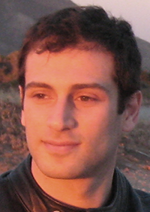 UW CSE Ph.D. student Alexei Czeskis was interviewed on American Public Media’s “Marketplace” concerning a program in San Antonio to track students within their high schools using RFID.
UW CSE Ph.D. student Alexei Czeskis was interviewed on American Public Media’s “Marketplace” concerning a program in San Antonio to track students within their high schools using RFID.
“Alexei Czeskis studies RFID privacy issues at the University of Washington’s Security and Privacy Research Lab. He says it’s hard to predict the consequences of collecting all this data on our children.
“‘We don’t know what it could be used for in the future,’ he says, ‘and that could be something good or it could be something really bad. For example, maybe it’s foreseeable that when these students apply to college for admission, colleges might be able to request this type of data. Those kinds of things could have implications for students further on in their lives.'”
Listen to the story here. Read more →
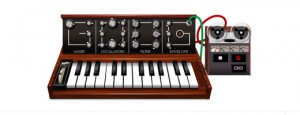 TNW reports:
TNW reports:
“Earlier in the week we reported on the pretty epic interactive Google doodle that was an homage to Dr Robert Moog. The super cool landing page allowed visitors to mess around with a virtual Moog synthesizer and then share their noisy creation with others as an application recorded and played back the sounds (On a virtual reel-to-reel no less!)
“One smart engineer is all it takes to push a project further of course. Karl Koscher is a Ph.D. student studying computer security at the University of Washington, and he told TNW …”
Read the post and try it out here. Read more →
 UW CSE’s SpiroSmart is featured by Futurity.
UW CSE’s SpiroSmart is featured by Futurity.









